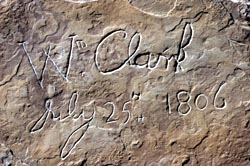William Clark
Updated: August 6, 2020

Almost immediately after his appointment by President Thomas Jefferson, Meriwether Lewis wrote a letter to his longtime friend William Clark asking him to be the expedition's co-leader.
Clark was four years older than Lewis and a seasoned frontiersman. Like Lewis, Clark was also from Virginia. Clark had spent a good deal of his life in the Ohio and Kentucky wilderness where he gained an understanding of and appreciation for Indians.
Clark was less formally educated than Lewis, but his practical experience in the woods was exactly what Lewis was looking for. And he was an experienced boatman and navigator as well.
The two met when Lewis served under Clark in the Army. The young officers saw action during the Indian Campaigns in the Ohio Valley some eight years before they shoved off the sandy shore of the Missouri River on May 14, 1804 and headed upstream.

In the field, the Lewis and Clark complemented each other in nearly every way. Clark’s easygoing, practical manner balanced Lewis’ somewhat moody and inflexible personality. Their journals never mention any conflict between the two.
Shortly after returning safe and sound to St. Louis, Clark married his long-time sweetheart Judith Hancock. They continued to live in St. Louis where Jefferson appointed Clark the U.S. Superintendent of Indian Affairs.
Clark named his first son Meriwether Lewis after his friend. He continued as an unofficial ambassador to West’s first people. Clark’s compassion was known throughout the various tribes, and he was well respected among the Indians, who called him their “red-headed chief.” Clark died of natural causes at age 68 at the home of his oldest son.
Updated: August 6, 2020

